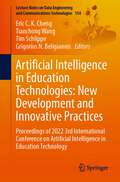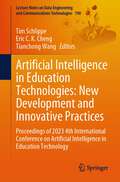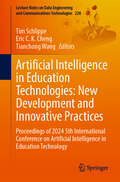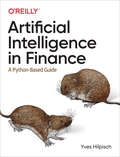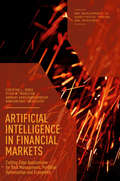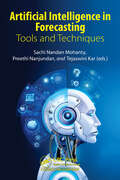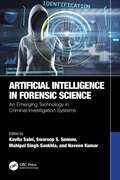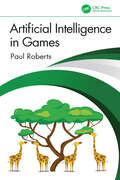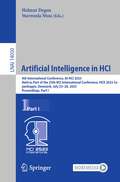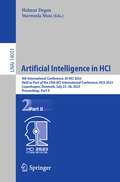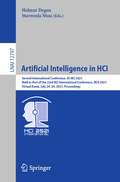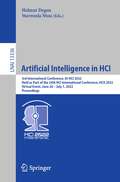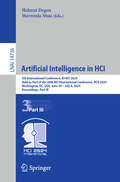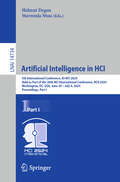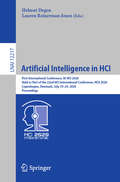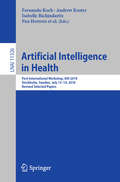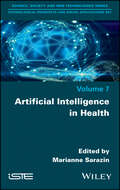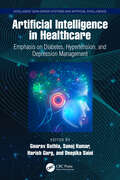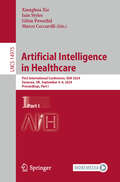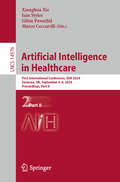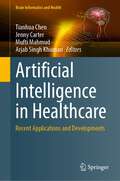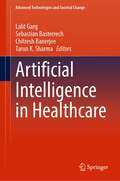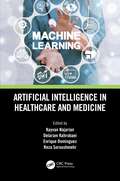- Table View
- List View
Artificial Intelligence in Education Technologies: Proceedings of 2022 3rd International Conference on Artificial Intelligence in Education Technology (Lecture Notes on Data Engineering and Communications Technologies #154)
by Eric C. K. Cheng Tianchong Wang Tim Schlippe Grigorios N. BeligiannisThis edited book is a collection of selected research papers presented at the 2022 3rd International Conference on Artificial Intelligence in Education Technology (AIET 2022), held in Wuhan, China, on July 1–3, 2022. AIET establishes a platform for AI in education researchers to present research, exchange innovative ideas, propose new models, as well as demonstrate advanced methodologies and novel systems. The book is divided into five main sections – 1) AI in Education in the Post-COVID New Norm, 2) Emerging AI Technologies, Methods, Systems and Infrastructure, 3) Innovative Practices of Teaching and Assessment Driven by AI and Education Technologies, 4) Curriculum, Teacher Professional Development and Policy for AI in Education, and 5) Issues and Discussions on AI In Education and Future Development. Through these sections, the book provides a comprehensive picture of the current status, emerging trends, innovations, theory, applications, challenges and opportunities of current AI in education research. This timely publication is well aligned with UNESCO’s Beijing Consensus on Artificial Intelligence (AI) and Education. It is committed to exploring how AI may play a role in bringing more innovative practices, transforming education in the post-pandemic new norm and triggering an exponential leap toward the achievement of the Education 2030 Agenda. Providing broad coverage of recent technology-driven advances and addressing a number of learning-centric themes, the book is an informative and useful resource for researchers, practitioners, education leaders and policy-makers who are involved or interested in AI and education.
Artificial Intelligence in Education Technologies: Proceedings of 2023 4th International Conference on Artificial Intelligence in Education Technology (Lecture Notes on Data Engineering and Communications Technologies #190)
by Tim Schlippe Eric C. K. Cheng Tianchong WangThis book is a collection of selected research papers presented at the 2023 4th International Conference on Artificial Intelligence in Education Technology (AIET 2023), held in Berlin, Germany, on June 30 - July 2, 2023. AIET establishes a platform for AI in education researchers to present research, exchange innovative ideas, propose new models, as well as demonstrate advanced methodologies and novel systems. It is a timely and up-to-date publication responsive to the rapid development of AI technologies, practices and their increasingly complex interplay with the education domain. It promotes the cross-fertilisation of knowledge and ideas from researchers in various fields to construct the interdisciplinary research area of AI in Education. These subject areas include computer science, cognitive science, education, learning sciences, educational technology, psychology, philosophy, sociology, anthropology and linguistics. The feature of this book will contribute from diverse perspectives to form a dynamic picture of AI in Education. It also includes various domain-specific areas for which AI and other education technology systems have been designed or used in an attempt to address challenges and transform educational practice. This timely publication is in line with UNESCO’s Beijing Consensus on Artificial Intelligence and Education. It is committed to exploring how AI may play a role in bringing more innovative practices, transforming education, and triggering an exponential leap towards the achievement of the Education 2030 Agenda. Providing broad coverage of recent technology-driven advances and addressing a number of learning-centric themes, the book is an informative and useful resource for researchers, practitioners, education leaders and policy-makers who are involved or interested in AI and education.
Artificial Intelligence in Education Technologies: Proceedings of 2024 5th International Conference on Artificial Intelligence in Education Technology (Lecture Notes on Data Engineering and Communications Technologies #228)
by Tim Schlippe Eric C. K. Cheng Tianchong WangThis book is a collection of selected research papers presented at the 2024 5th International Conference on Artificial Intelligence in Education Technology (AIET 2024), held in Barcelona, Spain, on July 29 - 31, 2024. AIET establishes a platform for AI in education researchers to present research, exchange innovative ideas, propose new models, as well as demonstrate advanced methodologies and novel systems. It is a timely and up-to-date publication responsive to the rapid development of AI technologies, practices and their increasingly complex interplay with the education domain. It promotes the cross-fertilisation of knowledge and ideas from researchers in various fields to construct the interdisciplinary research area of AI in Education. These subject areas include computer science, cognitive science, education, learning sciences, educational technology, psychology, philosophy, sociology, anthropology and linguistics. The feature of this book will contribute from diverse perspectives to form a dynamic picture of AI in Education. It also includes various domain-specific areas for which AI and other education technology systems have been designed or used in an attempt to address challenges and transform educational practice. Education stands as a cornerstone for societal progress, and ensuring universal access to quality education is integral to achieving Goal 4 of the United Nations' Sustainable Development Goals (SDGs). The goal is to ensure inclusive and equitable quality education for all by 2030. This involves not only expanding access to education but also improving the quality of education to promote lifelong learning opportunities. AI has the potential to significantly contribute to the achievement of Goal 4. It is committed to exploring how AI may play a role in bringing more innovative practices, transforming education, and triggering an exponential leap towards the achievement of the Education 2030 Agenda. Providing broad coverage of recent technology-driven advances and addressing a number of learning-centric themes, the book is an informative and useful resource for researchers, practitioners, education leaders and policy-makers who are involved or interested in AI and education.
Artificial Intelligence in Finance: A Python-based Guide
by Yves HilpischThe widespread adoption of AI and machine learning is revolutionizing many industries today. Once these technologies are combined with the programmatic availability of historical and real-time financial data, the financial industry will also change fundamentally. With this practical book, you'll learn how to use AI and machine learning to discover statistical inefficiencies in financial markets and exploit them through algorithmic trading.Author Yves Hilpisch shows practitioners, students, and academics in both finance and data science practical ways to apply machine learning and deep learning algorithms to finance. Thanks to lots of self-contained Python examples, you'll be able to replicate all results and figures presented in the book.In five parts, this guide helps you:Learn central notions and algorithms from AI, including recent breakthroughs on the way to artificial general intelligence (AGI) and superintelligence (SI)Understand why data-driven finance, AI, and machine learning will have a lasting impact on financial theory and practiceApply neural networks and reinforcement learning to discover statistical inefficiencies in financial marketsIdentify and exploit economic inefficiencies through backtesting and algorithmic trading--the automated execution of trading strategiesUnderstand how AI will influence the competitive dynamics in the financial industry and what the potential emergence of a financial singularity might bring about
Artificial Intelligence in Financial Markets: Cutting Edge Applications for Risk Management, Portfolio Optimization and Economics (New Developments in Quantitative Trading and Investment)
by Christian L. Dunis, Peter W. Middleton, Andreas Karathanasopolous and Konstantinos TheofilatosAs technology advancement has increased, so to have computational applications for forecasting, modelling and trading financial markets and information, and practitioners are finding ever more complex solutions to financial challenges. Neural networking is a highly effective, trainable algorithmic approach which emulates certain aspects of human brain functions, and is used extensively in financial forecasting allowing for quick investment decision making. This book presents the most cutting-edge artificial intelligence (AI)/neural networking applications for markets, assets and other areas of finance. Split into four sections, the book first explores time series analysis for forecasting and trading across a range of assets, including derivatives, exchange traded funds, debt and equity instruments. This section will focus on pattern recognition, market timing models, forecasting and trading of financial time series. Section II provides insights into macro and microeconomics and how AI techniques could be used to better understand and predict economic variables. Section III focuses on corporate finance and credit analysis providing an insight into corporate structures and credit, and establishing a relationship between financial statement analysis and the influence of various financial scenarios. Section IV focuses on portfolio management, exploring applications for portfolio theory, asset allocation and optimization. This book also provides some of the latest research in the field of artificial intelligence and finance, and provides in-depth analysis and highly applicable tools and techniques for practitioners and researchers in this field.
Artificial Intelligence in Forecasting: Tools and Techniques
by Sachi Nandan Mohanty Preethi Nanjundan Tejaswini KarForecasting deals with the uncertainty of the future. To be effective, forecasting models should be timely available, accurate, reliable, and compatible with existing database. Accurate projection of the future is of vital importance in supply chain management, inventory control, economic condition, technology, growth trend, social change, political change, business, weather forecasting, stock price prediction, earthquake prediction, etc. AI powered tools and techniques of forecasting play a major role in improving the projection accuracy. The software running AI forecasting models use machine learning to improve accuracy. The software can analyse the past data and can make better prediction about the future trends with higher accuracy and confidence that favours for making proper future planning and decision. In other words, accurate forecasting requires more than just the matching of models to historical data.The book covers the latest techniques used by managers in business today, discover the importance of forecasting and learn how it's accomplished. Readers will also be familiarised with the necessary skills to meet the increased demand for thoughtful and realistic forecasts.
Artificial Intelligence in Forensic Science: An Emerging Technology in Criminal Investigation Systems
by Naveen Kumar Kavita Saini Mahipal Singh Sankhla Swaroop S. SononeArtificial Intelligence in Forensic Science addresses the current and emerging opportunities being utilized to apply modern Artificial Intelligence (AI) technologies to current forensic and investigation practices. The book also showcases the increasing benefits of AI where and when it can be applied to various techniques and forensic disciplines. The increasing rate of sophisticated crimes has increased the opportunity and need for the forensic field to explore a variety of emerging technologies to counter criminals—and AI is no exception. There are many current investigative challenges that, with ingenuity and application, can be helped with the application of AI, especially in the digital forensic and cyber-crime arena. The book also explains many practical studies that have been carried out to test AI technologies in crime detection, uncovering evidence, and identifying perpetrators. In the last decade, the use of AI has become common in many fields and now is an ideal time to look at the various ways AI can be integrated into judicial, forensic, and criminal cases to better collect and analyze evidence, thereby improving outcomes.
Artificial Intelligence in Games
by Paul RobertsThis book covers all the necessary topics that a professional game AI programmer needs to know, from math and steering behaviours to terrain analysis, pathfinding and decision-making. Written to be easily accessible, each topic is accompanied by an example game that allows the reader to add their own code to see the effects their changes have. Each chapter is split into two parts. The first part covers the necessary theory in a friendly, conversational manner, using visual examples and fictional game scenarios to give additional context. The second part is a coding tutorial in C# for the topic at hand. Each chapter has its own example game available to download, written in C# in the Unity Game Engine. This book will be suitable for students and aspiring games programmers looking to gain a grounding in game AI techniques.
Artificial Intelligence in HCI: 4th International Conference, AI-HCI 2023, Held as Part of the 25th HCI International Conference, HCII 2023, Copenhagen, Denmark, July 23–28, 2023, Proceedings, Part I (Lecture Notes in Computer Science #14050)
by Helmut Degen Stavroula NtoaThis double volume book set constitutes the refereed proceedings of 4th International Conference, AI-HCI 2023, held as part of the 25th International Conference, HCI International 2023, which was held virtually in Copenhagen, Denmark in July 2023.The total of 1578 papers and 396 posters included in the HCII 2023 proceedings was carefully reviewed and selected from 7472 submissions. The first volume focuses on topics related to Human-Centered Artificial Intelligence, explainability, transparency and trustworthiness, ethics and fairness, as well as AI-supported user experience design. The second volume focuses on topics related to AI for language, text, and speech-related tasks, human-AI collaboration, AI for decision-support and perception analysis, and innovations in AI-enabled systems.
Artificial Intelligence in HCI: 4th International Conference, AI-HCI 2023, Held as Part of the 25th HCI International Conference, HCII 2023, Copenhagen, Denmark, July 23–28, 2023, Proceedings, Part II (Lecture Notes in Computer Science #14051)
by Helmut Degen Stavroula NtoaThis double volume book set constitutes the refereed proceedings of 4th International Conference, AI-HCI 2023, held as part of the 25th International Conference, HCI International 2023, which was held virtually in Copenhagen, Denmark in July 2023.The total of 1578 papers and 396 posters included in the HCII 2023 proceedings was carefully reviewed and selected from 7472 submissions. The first volume focuses on topics related to Human-Centered Artificial Intelligence, explainability, transparency and trustworthiness, ethics and fairness, as well as AI-supported user experience design. The second volume focuses on topics related to AI for language, text, and speech-related tasks, human-AI collaboration, AI for decision-support and perception analysis, and innovations in AI-enabled systems.
Artificial Intelligence in HCI: Second International Conference, AI-HCI 2021, Held as Part of the 23rd HCI International Conference, HCII 2021, Virtual Event, July 24–29, 2021, Proceedings (Lecture Notes in Computer Science #12797)
by Helmut Degen Stavroula NtoaThis book constitutes the refereed proceedings of the Second International Conference on Artificial Intelligence in HCI, AI-HCI 2021, which was held as part of HCI International 2021 and took place virtually during July 24-29, 2021.The total of 1276 papers and 241 posters included in the 39 HCII 2021 proceedings volumes was carefully reviewed and selected from 5222 submissions. The papers included in this volume were organized in topical sections as follows: Ethics, trust and explainability; human-centered AI; AI applications in HCI; and AI applications in smart environments.
Artificial Intelligence in HCI: 3rd International Conference, AI-HCI 2022, Held as Part of the 24th HCI International Conference, HCII 2022, Virtual Event, June 26 – July 1, 2022, Proceedings (Lecture Notes in Computer Science #13336)
by Helmut Degen Stavroula NtoaThis book constitutes the refereed proceedings of the Third International Conference on Artificial Intelligence in HCI, AI-HCI 2022, which was held as part of HCI International 2022 and took place virtually during June 26 – July 1, 2022. A total of 1271 papers and 275 posters included in the 39 HCII 2022 proceedings volumes. AI-HCI 2022 includes a total of 39 papers; they are grouped thematically as follows: Human-Centered AI; Explainable and Trustworthy AI; UX Design and Evaluation of AI-Enabled Systems; AI Applications in HCI.
Artificial Intelligence in HCI: 5th International Conference, AI-HCI 2024, Held as Part of the 26th HCI International Conference, HCII 2024, Washington, DC, USA, June 29–July 4, 2024, Proceedings, Part III (Lecture Notes in Computer Science #14736)
by Helmut Degen Stavroula NtoaThe three-volume book set LNAI 14734, 14735, and 14736 constitutes the refereed proceedings of 5th International Conference on Artificial Intelligence in HCI, AI-HCI 2024, held as part of the 26th International Conference, HCI International 2024, which took place in Washington, DC, USA, during June 29-July 4, 2024. The total of 1271 papers and 309 posters included in the HCII 2024 proceedings was carefully reviewed and selected from 5108 submissions. The AI-HCI 2024 proceedings were organized in the following topical sections: Part I: Human-centered artificial intelligence; explainability and transparency; AI systems and frameworks in HCI; Part II: Ethical considerations and trust in AI; enhancing user experience through AI-driven technologies; AI in industry and operations; Part III: Large language models for enhanced interaction; advancing human-robot interaction through AI; AI applications for social impact and human wellbeing.
Artificial Intelligence in HCI: 5th International Conference, AI-HCI 2024, Held as Part of the 26th HCI International Conference, HCII 2024, Washington, DC, USA, June 29 – July 4, 2024, Proceedings, Part I (Lecture Notes in Computer Science #14734)
by Helmut Degen Stavroula NtoaThe three-volume book set LNAI 14734, 14735, and 14736 constitutes the refereed proceedings of 5th International Conference on Artificial Intelligence in HCI, AI-HCI 2024, held as part of the 26th International Conference, HCI International 2024, which took place in Washington, DC, USA, during June 29-July 4, 2024. The total of 1271 papers and 309 posters included in the HCII 2024 proceedings was carefully reviewed and selected from 5108 submissions. The AI-HCI 2024 proceedings were organized in the following topical sections: Part I: Human-centered artificial intelligence; explainability and transparency; AI systems and frameworks in HCI; Part II: Ethical considerations and trust in AI; enhancing user experience through AI-driven technologies; AI in industry and operations; Part III: Large language models for enhanced interaction; advancing human-robot interaction through AI; AI applications for social impact and human wellbeing.
Artificial Intelligence in HCI: First International Conference, AI-HCI 2020, Held as Part of the 22nd HCI International Conference, HCII 2020, Copenhagen, Denmark, July 19–24, 2020, Proceedings (Lecture Notes in Computer Science #12217)
by Helmut Degen Lauren Reinerman-JonesThis book constitutes the refereed proceedings of the First International Conference on Artificial Intelligence in HCI, AI-HCI 2020, held as part of the 22nd International Conference on Human-Computer Interaction, HCII 2020, in July 2020. The conference was planned to be held in Copenhagen, Denmark, but had to change to a virtual conference mode due to the COVID-19 pandemic. The conference presents results from academic and industrial research, as well as industrial experiences, on the use of Artificial Intelligence technologies to enhance Human-Computer Interaction. From a total of 6326 submissions, a total of 1439 papers and 238 posters has been accepted for publication in the HCII 2020 proceedings. The 30 papers presented in this volume were organized in topical sections as follows: Human-Centered AI; and AI Applications in HCI.pical sections as follows: Human-Centered AI; and AI Applications in HCI.
Artificial Intelligence in Health: First International Workshop, AIH 2018, Stockholm, Sweden, July 13-14, 2018, Revised Selected Papers (Lecture Notes in Computer Science #11326)
by Fernando Koch Andrew Koster David Riaño Sara Montagna Michael Schumacher Annette Ten Teije Christian Guttmann Manfred Reichert Isabelle Bichindaritz Pau Herrero Richard Lenz Beatriz López Cindy Marling Clare Martin Stefania Montani Nirmalie WiratungaThis book constitutes the refereed post-conference proceedings of the First International Workshop on Artificial Intelligence in Health, AIH 2018, in Stockholm, Sweden, in July 2018. This workshop consolidated the workshops CARE, KRH4C and AI4HC into a single event.The 18 revised full papers included in this volume were carefully selected from the 26 papers accepted for presentation out of 42 initial submissions. The papers present AI technologies with medical applications and are organized in three tracks: agents in healthcare; data science and decision systems in medicine; and knowledge management in healthcare.
Artificial Intelligence in Health
by Marianne SarazinUndeniable, inescapable, exhilarating and breaking free from the exclusive domain of science, artificial intelligence has become our main preoccupation. A major generator of new mathematical thinking, AI is the result of easy access to information and data, as facilitated by computer technology. Big Data has come to be seen as an unlimited source of knowledge, the use of which is still being fully explored, but its industrialization has swiftly followed in the footsteps of mathematicians; today's tools are increasingly designed to replace human beings, which comes with social and philosophical consequences. Drawing on examples of scientific work and the insights of experts, this book offers food for thought on the consequences and future of AI technology in education, health, the workplace and aging.
Artificial Intelligence in Health Care: The Hope, the Hype, the Promise, the Peril
by National Academy of Medicine The Learning Health System SeriesThe emergence of artificial intelligence (AI) in health care offers unprecedented opportunities to improve patient and clinical team outcomes, reduce costs, and impact population health. While there have been a number of promising examples of AI applications in health care, it is imperative to proceed with caution or risk the potential of user disillusionment, another AI winter, or further exacerbation of existing health- and technology-driven disparities. This Special Publication synthesizes current knowledge to offer a reference document for relevant health care stakeholders. It outlines the current and near-term AI solutions; highlights the challenges, limitations, and best practices for AI development, adoption, and maintenance; offers an overview of the legal and regulatory landscape for AI tools designed for health care application; prioritizes the need for equity, inclusion, and a human rights lens for this work; and outlines key considerations for moving forward. AI is poised to make transformative and disruptive advances in health care, but it is prudent to balance the need for thoughtful, inclusive health care AI that plans for and actively manages and reduces potential unintended consequences, while not yielding to marketing hype and profit motives.
Artificial Intelligence in Health Professions Education: Proceedings Of A Workshop
by National Academies of Sciences, Engineering, and Medicine Health and Medicine Division Board on Global Health Global Forum on Innovation in Health Professional EducationThe National Academies Global Forum on Innovation in Health Professional Education hosted a multi-day workshop series in March and April 2023 to explore the potential of artificial intelligence (AI) in health professions education. Speakers at the workshops provided background on AI; discussed the social, cultural, policy, legal, and regulatory considerations to integrating AI into health care and training; considered the skills health professionals will need as educators and providers to effectively use AI in practice; and explored needs for educating the next generation of health workers. Speakers took consideration of the bias, burden, health equity concerns that introducing AI into clinical education would bring. This Proceedings of a Workshop summarizes the discussions held during the workshop.
Artificial Intelligence in Healthcare: Emphasis on Diabetes, Hypertension, and Depression Management (Intelligent Data-Driven Systems and Artificial Intelligence)
by Gourav Bathla Sanoj Kumar Harish Garg Deepika SainiThis book presents state-of-the-art research works for a better understanding of the advantages and limitations of AI techniques in the field of healthcare. It will further discuss artificial intelligence applications in depression, hypertension and diabetes management. The text also presents an artificial intelligence chatbot for depression, diabetes, and hypertension self-help.This book: Provides a structured overview of recent developments of artificial intelligence applications in the healthcare sector. Presents an in-depth understanding of how artificial intelligence techniques can be applied to diabetes management. Showcases supervised learning techniques based on datasets for depression management. Discusses artificial intelligence chatbot for diabetes, depression, and hypertension self-care. Highlights the importance of artificial intelligence in managing and predicting diabetes, hypertension, and depression. The text is primarily written for senior undergraduate, graduate students, and academic researchers in diverse fields including electrical engineering, electronics and communications engineering, computer science and engineering, and biomedical engineering.
Artificial Intelligence in Healthcare: First International Conference, AIiH 2024, Swansea, UK, September 4–6, 2024, Proceedings, Part I (Lecture Notes in Computer Science #14975)
by Marco Ceccarelli Xianghua Xie Iain Styles Gibin PowathilThe two-volume set LNCS 14975 + 14976 constitutes the proceedings of the First International Conference on Artificial Intelligence in Healthcare, AIiH 2024, which took place in Swansea, UK, in September 2024. The 47 full papers included in the proceedings were carefully reviewed and selected from 70 submissions. They were organized in the following topical sections: Part I: Personalised Healthcare and Medicine; AI driven early diagnosis and prevention; AI driven robotics for healthcare; AI in mental health; Part II: AI in proactive care and intervention; AI-aided medical imaging and analysis; Medical signal and image processing; Assisted living technology; Digital twinning, virtual pathology and oncology; Patient data, privacy and ethics.
Artificial Intelligence in Healthcare: First International Conference, AIiH 2024, Swansea, UK, September 4–6, 2024, Proceedings, Part II (Lecture Notes in Computer Science #14976)
by Marco Ceccarelli Xianghua Xie Iain Styles Gibin PowathilThe two-volume set LNCS 14975 + 14976 constitutes the proceedings of the First International Conference on Artificial Intelligence in Healthcare, AIiH 2024, which took place in Swansea, UK, in September 2024. The 47 full papers included in the proceedings were carefully reviewed and selected from 70 submissions. They were organized in the following topical sections: Part I: Personalised Healthcare and Medicine; AI driven early diagnosis and prevention; AI driven robotics for healthcare; AI in mental health; Part II: AI in proactive care and intervention; AI-aided medical imaging and analysis; Medical signal and image processing; Assisted living technology; Digital twinning, virtual pathology and oncology; Patient data, privacy and ethics.
Artificial Intelligence in Healthcare: Recent Applications and Developments (Brain Informatics and Health)
by Tianhua Chen Jenny Carter Mufti Mahmud Arjab Singh KhumanRecent advances in artificial intelligence (AI) and machine learning have witnessed many successes in various disciplines including the healthcare sector. Innovations in intelligent medical systems have revolutionized the way in which healthcare services are provided, ranging from making clinical diagnosis, developing personalized treatment and drugs, assisting patient monitoring, to automating administrative tasks and reducing operational costs. In this book, the authors present key applications in the general area of health care, where AI has made significant successes. From the individual chapters, the readers will be provided with a range of examples to illustrate the wide plethora of application domains utilizing state-of-the-art AI techniques, proving credence to the versatility and effectiveness of an AI approach in health care and medicine. We envisage that this book is ideal for individuals new to the notion of AI in health care, equally, early career academics who wish to further expand on their knowledge in AI in medicine. What will be presented is in no means an exhaustive list of applications, but most definitely a varied one.
Artificial Intelligence in Healthcare (Advanced Technologies and Societal Change)
by Lalit Garg Sebastian Basterrech Chitresh Banerjee Tarun K. SharmaThis book highlights the analytics and optimization issues in healthcare systems, proposes new approaches, and presents applications of innovative approaches in real facilities. In the past few decades, there has been an exponential rise in the application of swarm intelligence techniques for solving complex and intricate problems arising in healthcare. The versatility of these techniques has made them a favorite among scientists and researchers working in diverse areas. The primary objective of this book is to bring forward thorough, in-depth, and well-focused developments of hybrid variants of swarm intelligence algorithms and their applications in healthcare systems.
Artificial Intelligence in Healthcare and Medicine
by Kayvan NajarianThis book provides a comprehensive overview of the recent developments in clinical decision support systems, precision health, and data science in medicine. The book targets clinical researchers and computational scientists seeking to understand the recent advances of artificial intelligence (AI) in health and medicine. Since AI and its applications are believed to have the potential to revolutionize healthcare and medicine, there is a clear need to explore and investigate the state-of-the-art advancements in the field. This book provides a detailed description of the advancements, challenges, and opportunities of using AI in medical and health applications. Over 10 case studies are included in the book that cover topics related to biomedical image processing, machine learning for healthcare, clinical decision support systems, visualization of high dimensional data, data security and privacy, bioinformatics, and biometrics. The book is intended for clinical researchers and computational scientists seeking to understand the recent advances of AI in health and medicine. Many universities may use the book as a secondary training text. Companies in the healthcare sector can greatly benefit from the case studies covered in the book. Moreover, this book also: Provides an overview of the recent developments in clinical decision support systems, precision health, and data science in medicine Examines the advancements, challenges, and opportunities of using AI in medical and health applications Includes 10 cases for practical application and reference Kayvan Najarian is a Professor in the Department of Computational Medicine and Bioinformatics, Department of Electrical Engineering and Computer Science, and Department of Emergency Medicine at the University of Michigan, Ann Arbor. Delaram Kahrobaei is the University Dean for Research at City University of New York (CUNY), a Professor of Computer Science and Mathematics, Queens College CUNY, and the former Chair of Cyber Security, University of York. Enrique Domínguez is a professor in the Department of Computer Science at the University of Malaga and a member of the Biomedical Research Institute of Malaga. Reza Soroushmehr is a Research Assistant Professor in the Department of Computational Medicine and Bioinformatics and a member of the Michigan Center for Integrative Research in Critical Care, University of Michigan, Ann Arbor.
